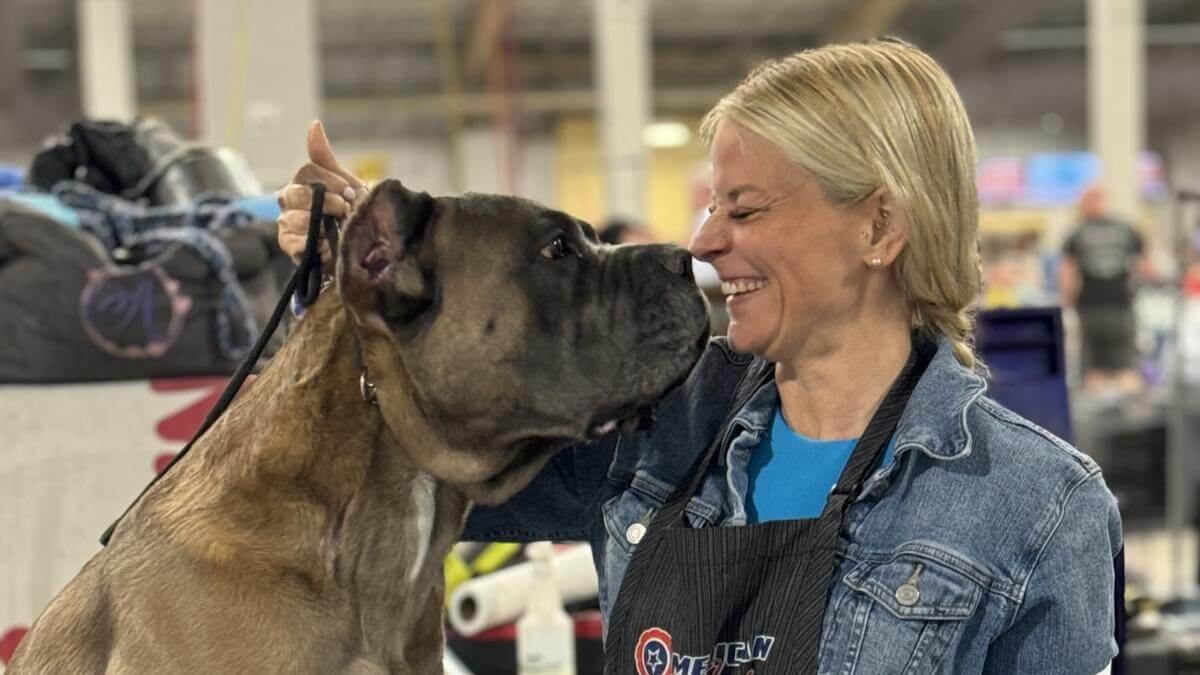
Home » Jennifer Thomason | Big Country Cane Corso

Jennifer Thomason
1. I live about an hour outside of Nashville, Tennessee, in a rural area where I have the space and environment ideal for raising strong, healthy dogs. I’ve been involved with purebred dogs for over 25 years, and for the past nine years I’ve focused on breeding the Cane Corso. My kennel, Big Country Cane Corso, reflects my love for this majestic and protective breed as well as my commitment to raising well-tempered, structurally sound dogs. At Big Country, we strive to produce Cane Corsos (Cani Corsi is the plural form in Italian) that not only meet the Breed Standard but also have the strength, loyalty, and intelligence the breed is known for.
2. The Cane Corso is known for its powerful, athletic build, protective instincts, and deep loyalty to its family. One of the key hallmarks of the breed is its calm and stable temperament, especially when well-socialized from an early age. These dogs are large and imposing, but they are also known for their intelligence and ability to adapt to family life. Maintaining these core traits is essential for the breed’s identity because the Cane Corso was originally bred as a guardian, working dog, and protector. By preserving these traits, we ensure that the breed remains both a loving companion and an effective protector, while also maintaining its distinct appearance and noble character.
3. I always assess the demand for Cane Corso puppies very carefully. In my opinion, there is still a strong demand for well-bred Cane Corsos, particularly from families or individuals who understand the breed’s needs and are prepared for their size and protective nature. That said, I am committed to breeding responsibly, so I make sure to place each puppy in a home that is not only ready for a Cane Corso but also appreciates the responsibility that comes with owning such a powerful breed. While there is demand, I always prioritize quality over quantity, ensuring that each litter is bred with intention and that the puppies go to homes where they can thrive.
4. At Big Country Cane Corso, I’ve embraced modern technologies to improve both the health of the dogs and the communication with potential puppy owners. I use genetic testing to screen for inherited conditions common in the Cane Corso breed, which helps me ensure that I am breeding healthy puppies. I also keep detailed digital records of each dog’s lineage and health history, which is vital for tracking traits and ensuring long-term breed health. Additionally, social media and a website have been great tools to share information about the breed and our dogs, educate potential owners, and provide updates on available puppies. These technologies help to ensure transparency, effective communication, and responsible breeding practices.
5. Yes, I’ve noticed a shift in how people view purebred dogs, particularly in the context of Cane Corsos. More and more, people are realizing the value of working with a responsible breeder who prioritizes the health, temperament, and integrity of the breed. With Cane Corsos, the importance of careful breeding practices is becoming more recognized, as people are seeking dogs that will be loyal companions, protective family members, and adaptable to their homes. The public is becoming more educated about the value of supporting ethical breeders who have a deep understanding of the breed’s characteristics and needs, and I’ve seen that reflected in the growing interest in Cane Corsos from knowledgeable owners.
6. With the growing popularity of the Cane Corso, there’s been an increase in backyard breeders who are breeding these dogs without proper knowledge or regard for the breed’s health and temperament. This trend is concerning because these breeders often prioritize quick profits over responsible practices, leading to puppies with potential health issues, unstable temperaments, and poor socialization. In some cases, there’s also been a push to breed for extreme size or aggression, which can result in dogs that don’t meet the true Breed Standard. While the Cane Corso is naturally a powerful and protective breed, breeding for exaggerated traits such as excessive size or heightened aggression can lead to dogs that are not only unhealthy but also unsuitable as family companions. This shift towards breeding for extremes is something I find troubling, as it can distort the true nature of the breed, making them more difficult to handle or more prone to health problems. It’s important for prospective owners to be aware of these risks and choose ethical breeders who focus on producing well-rounded, healthy, and stable Cane Corsos, rather than dogs bred for looks or profit alone.
7. In recent years, I’ve seen a growing emphasis on the health and well-being of purebred dogs, and this is a trend I wholeheartedly support. With the advent of genetic testing and more stringent health screening processes, breeders are now better equipped to make informed decisions and reduce the risk of passing on inherited conditions. This is incredibly important for a breed like the Cane Corso, which has specific health concerns that need to be monitored. Additionally, there is more transparency in the breeding process, and I’ve noticed a greater emphasis on educating the public about the responsibilities of owning a breed like the Cane Corso. This focus on ethical breeding practices and long-term health is helping to ensure that the breed continues to thrive in the right homes.